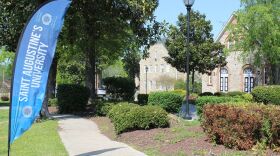At North Carolina Agricultural and Technical State University’s community garden, there are about eight small plots reserved for students to plant their own crops. A&T is located in a food desert, which is an area that has limited access to affordable and nutritious food.
Along with a food pantry, and community garden leadership trainings, these plots are one of the many ways A&T uses its resources to support food-insecure students.
The garden is maintained by senior agricultural education major Nia McLean. During my visit, McLean showed me the frozen-over lettuce from last year's harvest as she talked about the value of the project.
“Something that's consistent, that I've seen within our community, is that we really want to help each other. And I think that, at A&T, has kind of furthered,” McLean said. “I've also volunteered at pantries everywhere I've lived, and so it's something that's very close to my heart. And I know that a lot of people in my own community experience it.”
The emphasis on community is one of the primary reasons McLean chose to transfer to A&T from her previous school in Boston, which was a predominately white university.
“When I came [to A&T], it felt like home I knew that going to an HBCU would give me the same college experience that white students have at a PWI which is not having to worry about racial aggression,” McLean explained. “And it's also just, it's really nice to be around people that have gone through the same experiences as you, that go through the world the same way you do. Especially for me since I grew up in primarily white spaces. This was a great experience for me.”

Outside of planting rhubarb and tomatoes in her small family garden, McLean’s Boston community didn’t provide many opportunities for interactions with agriculture. Because of this, she began to see the way food insecurity was impacting her community. This motivated her to join the agriculture education program at A&T.
“I want to expand food literacy, especially to minority populations, and to people who live in urban areas. For me doing food justice work is really a part of my identity because I know that African American or Black American identities around food have been challenged and predetermined in a lot of ways,” said McLean. “And so, for me, working with food and agricultural literacy, and having people be more connected to their food system is my way of giving back to my community and making sure that we have a resilience to the constant pressures that we are put under.”
McLean hopes that as more folks understand where their food comes from, more communities will become empowered to identify and find solutions for more food accessibility in their neighborhoods.
'Spirit of activism'
While McLean focuses on growing food in the garden, roots on campus grow Black scholars and leaders like sophomore Jayden Seay, who knew he would be an A&T graduate from day one.
“The day of my first campus tour was my sophomore year of high school. And I just remember stepping on campus and feeling the love and feeling the community. And knowing from that moment on, I had to come here,” said Seay.
I spoke with Seay at the A&T student union, a place he visits often to stay connected with the campus community. During our conversation, he told me this was the only college he applied to because he appreciates how A&T cultivates a spirit of activism and hopes to walk in the shoes of historical A&T alumni.
“When I learned about the A&T for the first time, when I learned that Jesse Jackson went here, Ronald McNair, Alma Adams, all these like, amazing people who have impacted history went here, I knew that I had to come to walk the same ground as them,” Seay said. “Then I got an email about this new February One scholarship. And I put in my application not thinking of anything, and I got it. So I'm here as an inaugural February One scholar on a full ride. So I'm grateful.”
As a scholarship recipient, Seay is on a fast track to obtaining the degree he dreams of. But it's not only A&T’s academics that Seay treasures, it's the insulation of being at a university where your authentic self is valued and protected.

“We have four years on this campus where we get to be the [majority]. And every year after A&T, you'll be back in the minority,” Seay said. “And you'll be back having to defend your right to be in the room that you're in, defend your qualifications. And having these four years where I don't have to defend my existence, and I can just grow and develop and get stronger and myself is an experience I wouldn’t trade anything for.”
I graduated from A&T, and a thing that I really valued was how my professors on the campus created this sense of belonging where I could see myself and see a piece of myself in everybody that I interacted with. I asked Seay, how does A&T create that sense of belonging for him?
“You've really said it there with: 'See yourself in everybody.' It's really impactful for me, as a black student who wants to go on and eventually get a master's degree or a Ph.D.,” Seay explained. “Like, seeing all these black people with Ph.D.s and these advanced degrees and research and experience who have really been able to take what they have and impact, even if it's just 1% better for the next person, that's better than it was before.”
Seay hopes to take his history education degree and create national change to combat the pushback against critical race theory and encourage activism. He and McLean plan to follow in the footsteps of their Aggie predecessors and impact their communities in a way that reverberates for generations to come.







